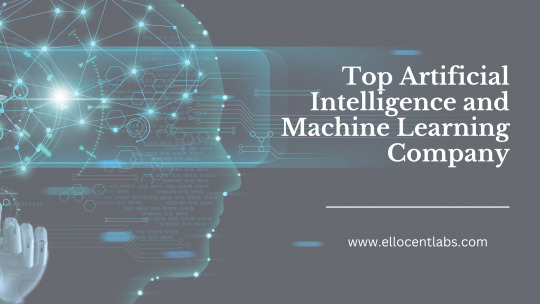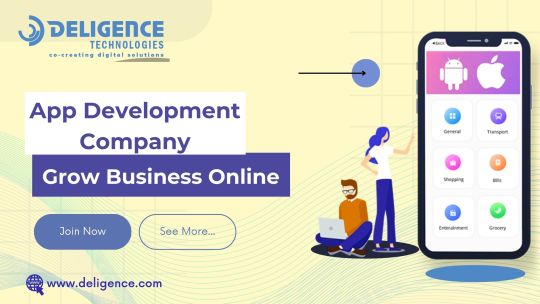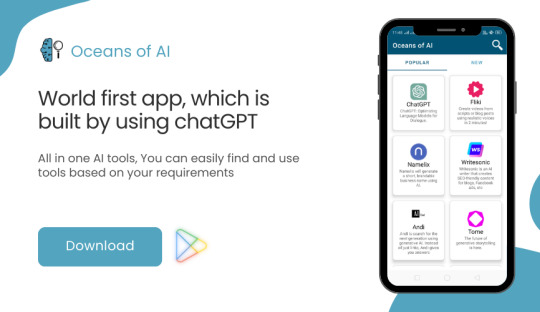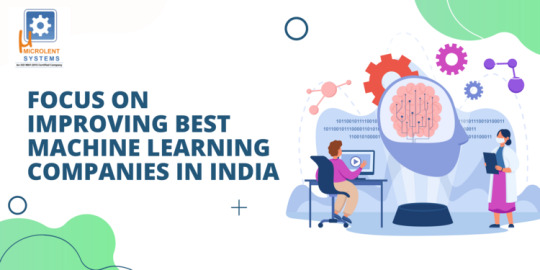#machine learning app development
Explore tagged Tumblr posts
Text
#machine learning app development#machine learning development#machine learning development services#machine learning development company
2 notes
·
View notes
Text
#ai app development#Machine Learning App Development#ai ml development services#ai software development services#advanced technologies#technology
0 notes
Text

Exciting News! Our latest blog is out now! Discover the Power of Machine Learning App Development! Dive into the world of cutting-edge technology and explore the incredible benefits of Machine Learning App Development. In our latest blog, "Machine Learning App Development Benefits & Tech Stack," we unveil the secrets behind developing intelligent and innovative applications that revolutionize user experiences. Learn about the game-changing advantages of integrating Machine Learning into your app development process and how it can enhance personalization, automation, and efficiency. Get insights into the advanced Tech Stack required for building powerful
applications and gain a competitive edge in the digital landscape. Unleash the potential of Machine Learning and unlock limitless possibilities for your app development journey!
Read the full blog here:
#connect infosoft#Machine Learning#Machine Learning App Development#App Development#benefits#ML#tech stack
1 note
·
View note
Text
Explore the innovative software development services offered by Software Development Hub (SDH). From MVP development and AI-powered solutions to ERP software, IoT, and cloud migration, SDH delivers cutting-edge expertise for startups and businesses worldwide. Discover insights, project highlights, and tips on building user-centric applications and driving digital transformation.
#software development#web app development#mobile app development#artificial intelligence#saas development company#custom app development#product development#erp software#enterprise software#python#machine learning development#IoT and IIoT development#machine learning#api development
6 notes
·
View notes
Text

Summer Internship Program 2024
For More Details Visit Our Website - internship.learnandbuild.in
#machine learning#programming#python#linux#data science#data scientist#frontend web development#backend web development#salesforce admin#salesforce development#cloud AI with AWS#Internet of things & AI#Cyber security#Mobile App Development using flutter#data structures & algorithms#java core#python programming#summer internship program#summer internship program 2024
2 notes
·
View notes
Text
In this blog, we discuss how Artificial Intelligence (AI) and Machine Learning (ML) developed mobile app can reshaping homeowner associations in the coming decade of real estate.
#Artificial Intelligence#Machine Learning#AI#ML#Real Estate#Real Estate Sector#Real Estate Industry#Homeowner Associations#HOA Mobile App#HOA App Development#HOA Mobile App Development#Arizona#USA#SkyTech Mobile
3 notes
·
View notes
Text
Top Artificial Intelligence and Machine Learning Company

In the rapidly evolving landscape of technology, artificial intelligence, and machine learning have emerged as the driving forces behind groundbreaking innovations. Enterprises and industries across the globe are recognizing the transformative potential of AI and ML in solving complex challenges, enhancing efficiency, and revolutionizing processes.
At the forefront of this revolution stands our cutting-edge AI and ML company, dedicated to pushing the boundaries of what is possible through data-driven solutions.
Company Vision and Mission
Our AI and ML company was founded with a clear vision - to empower businesses and individuals with intelligent, data-centric solutions that optimize operations and fuel innovation.
Our mission is to bridge the gap between traditional practices and the possibilities of AI and ML. We are committed to delivering superior value to our clients by leveraging the immense potential of AI and ML algorithms, creating tailor-made solutions that cater to their specific needs.
Expert Team of Data Scientists
The backbone of our company lies in our exceptional team of data scientists, AI engineers, and ML specialists. Their diverse expertise and relentless passion drive the development of advanced AI models and algorithms.
Leveraging the latest technologies and best practices, our team ensures that our solutions remain at the cutting edge of the industry. The synergy between data science and engineering enables us to deliver robust, scalable, and high-performance AI and ML systems.
Comprehensive Services
Our AI and ML company offers a comprehensive range of services covering various industry verticals:
1. AI Consultation: We partner with organizations to understand their business objectives and identify opportunities where AI and ML can drive meaningful impact.
Our expert consultants create a roadmap for integrating AI into their existing workflows, aligning it with their long-term strategies.
2. Machine Learning Development: We design, develop, and implement tailor-made ML models that address specific business problems. From predictive analytics to natural language processing, we harness ML to unlock valuable insights and improve decision-making processes.
3. Deep Learning Solutions: Our deep learning expertise enables us to build and deploy intricate neural networks for image and speech recognition, autonomous systems, and other intricate tasks that require high levels of abstraction.
4. Data Engineering: We understand that data quality and accessibility are vital for successful AI and ML projects. Our data engineers create robust data pipelines, ensuring seamless integration and preprocessing of data from multiple sources.
5. AI-driven Applications: We develop AI-powered applications that enhance user experiences and drive engagement. Our team ensures that the applications are user-friendly, secure, and optimized for performance.
Ethics and Transparency
As an AI and ML company, we recognize the importance of ethics and transparency in our operations. We adhere to strict ethical guidelines, ensuring that our solutions are built on unbiased and diverse datasets.
Moreover, we are committed to transparent communication with our clients, providing them with a clear understanding of the AI models and their implications.
Innovation and Research
Innovation is at the core of our company. We invest in ongoing research and development to explore new frontiers in AI and ML. Our collaboration with academic institutions and industry partners fuels our drive to stay ahead in this ever-changing field.
Conclusion
Our AI and ML company is poised to be a frontrunner in shaping the future of technology-driven solutions. By empowering businesses with intelligent AI tools and data-driven insights, we aspire to be a catalyst for positive change across industries.
As the world continues to embrace AI and ML, we remain committed to creating a future where innovation, ethics, and transformative technology go hand in hand.
#best software development company#artificial intelligence#software development company chandigarh#ai and ml#marketing#artificial intelligence for app development#artificial intelligence app development#machine learning development company
3 notes
·
View notes
Text
Why is Mobile Application Development Important for Online Business Growth?

Mobile application development is crucial for the growth of online businesses for several reasons:
Increased Accessibility: With the increasing number of smartphone users, mobile applications provide businesses with an opportunity to reach a wider audience. A mobile app ensures that customers can access your business and services from anywhere, at any time.
Improved Customer Engagement: Mobile apps provide businesses with an opportunity to engage with customers on a more personal level. By sending push notifications, offering personalized deals, and creating loyalty programs, businesses can create a stronger connection with their customers.
Enhanced Customer Experience: A well-designed mobile app can enhance the overall customer experience by providing a user-friendly interface, easy navigation, and quick access to products or services.
Competitive Advantage: With so many businesses offering online services, having a mobile app can provide a competitive edge. A mobile app can help your business stand out and differentiate itself from competitors.
Increased Revenue: By offering a mobile app, businesses can generate additional revenue streams through in-app purchases, subscriptions, and mobile advertising.
Overall, mobile app development is crucial for online business growth as it provides a more convenient, engaging, and personalized experience for customers while also offering businesses a competitive advantage and additional revenue streams.
#mobile app#mobile app development#android app development#android#app development#mobile#app#development#deligence#software development#software engineer#online business#business#programming#machine learning#learning
5 notes
·
View notes
Text
#machine learning development services#machine learning app development#machine learning#machine learning development
0 notes
Text

Computer Coder is a leading Summer & Industrial IT Training Institute located in Jaipur, India. The institute provides comprehensive training programs in various IT domains, including software development, web development, data science, digital marketing, and more.
Computer Coder has a team of experienced and certified trainers who provide hands-on training to students, making them industry-ready. The training programs are designed to equip students with the latest technologies and tools used in the IT industry.
The institute offers flexible training schedules and customized courses that cater to the unique requirements of students. Computer Coder also provides placement assistance to students and has tie-ups with several top IT companies in India.
With its state-of-the-art infrastructure, modern teaching methodologies, and industry-oriented training programs, Computer Coder has established itself as one of the best IT training institutes in Jaipur.
visit our website : https://www.computercoder.in/
#computer coder near me#best programming languages#software development#coding challenges#algorithm design#best Summer & Industrial Training Institute in Jaipur#best It Institute#computer coder#debugging#version control#syntax#code libraries#integrated development environments (IDEs)#code optimization#web development#mobile app development#artificial intelligence (AI)#machine learning (ML)#data science#cybersecurity#cloud computing#open-source software#software engineering
2 notes
·
View notes
Text
World first app, which is built by using chatGPT
This is an android app called “Oceans of AI” that is written in kotlin by using chatGPT prompts. this article will tell you the story about it and also provide the link to a full video of chatGPT prompts, so you can see how it's built

How it’s started:
After the launch of chatGPT, everyone is afraid about their jobs, especially in the world of programmers. As a junior developer, it scared me a lot because This AI chatbot is actually doing work very well. off course, there are lots of programmers saying that it’s giving outdated code and performance voice it’s not that great and it’s true for now but the thing is this AI tool is just the beginning, not the end it will be perfect in the next few months
How I created the whole app by using ChatGPT:
Idea: I was looking for an idea that will be useful, according to trends, and easy to build. And because ai tools are trending and I wanted to build an app by using Artificial intelligence so I thought maybe I should build an app that contains lots of ai tools that people can use to do their job fast by using Artificial intelligence tools
chatGPT work: Like other people, I just go and say my idea to see if it can create but we can’t create a full app like that because of chatGPT limits this is not the right approach to follow. so I tried to build it like developers. so I started following a step-by-step process to build this. I started with creating fragments and like that one by one, I build every other feature and complete the whole app. you can see all the prompts and code provided by chatGPT in this video
Ok, so what about Backend?
Yes. This is also created by using chatGPT
The app is available on the Google Play Store, and a full video of the implementation is available on Youtube
Thank You for reading. I hope it will help developers, how they can build their projects fast and understand the power of AI.
#chatgpt#artificial intelligence#ai tools#open ai#android#mobile#news#world news#developer#programmers#tech#technology#tech trends#ai image#ai art#aiartcommunity#machine learning#mobile app development#software#information technology#tech news
2 notes
·
View notes
Text
India is a hub for technology and innovation and the field of machine learning Solution Development in India — Microlent Systems

India is a hub for technology and innovation, and the field of machine learning is no exception. With a growing number of companies specializing in this field, it can be challenging to know which one to choose. In this article, we will discuss the best machine learning companies in India, with a special focus on Microlent Systems.
Microlent Systems: Microlent Systems is a software development company located in Jodhpur, Rajasthan, that specializes in machine learning. They offer a range of services, including data analysis, predictive modeling, and natural language processing. They have worked with clients across various industries, from healthcare to finance.
Fractal Analytics: Fractal Analytics is a data analytics company that specializes in machine learning. They offer a range of services, including data engineering, data visualization, and artificial intelligence. They have worked with clients such as Microsoft, Coca-Cola, and PepsiCo.
Wipro: Wipro is a global technology company that offers machine learning solutions, including predictive maintenance, fraud detection, and chatbot development. They have worked with clients across various industries, including banking, healthcare, and retail.
Analytics India Magazine: Analytics India Magazine is a media company that covers the latest trends and developments in the field of machine learning. They offer training programs, research reports, and industry events to help businesses stay up-to-date with the latest developments in machine learning.
Tiger Analytics: Tiger Analytics is a consulting firm that offers machine learning solutions, including predictive modeling, optimization, and data visualization. They have worked with clients such as Adidas, Samsung, and Amazon.
LatentView Analytics: LatentView Analytics is a data analytics company that offers machine learning solutions, including customer segmentation, price optimization, and demand forecasting. They have worked with clients such as Microsoft, Coca-Cola, and Johnson & Johnson.
BRIDGEi2i: BRIDGEi2i is a consulting firm that offers machine learning solutions, including sales forecasting, customer segmentation, and supply chain optimization. They have worked with clients across various industries, including banking, retail, and healthcare.
Amazon Web Services: Amazon Web Services (AWS) offers a range of machine learning solutions, including image and speech recognition, chatbot development, and predictive analytics. They have worked with clients such as Netflix, Airbnb, and Samsung.
In conclusion, there are several excellent machine learning companies in India, each offering unique solutions and services. Microlent Systems stands out among them, with its expertise in data analysis, predictive modeling, and natural language processing. Located in Jodhpur, Rajasthan, they are well-positioned to provide high-quality machine learning solutions to clients across various industries.
Read More :
https://microlent.com/blog/why-you-should-focus-on-improving-best-machine-learning-companies-in-india.html
#softwaredevelopment#machinelearning#india#dubai#uae#usa#web development#mobile app development#software#startups in india#innovation#technology#ai#ml solution#machine learning#machine learning course
4 notes
·
View notes
Text

Machine Learning
For more information about their services and to explore how they can assist your business, visit their official website at https://www.shanviatech.com/
#technology#app developers#web developers#digital marketing#ecommerce development company#artificial intelligence#machine learning
0 notes
Text
Maxtra Technologies: Your Trusted Artificial Intelligence Development Company
Maxtra Technologies, a trusted Artificial Intelligence Development Company, delivers innovative AI solutions to enhance efficiency, drive growth, and personalize experiences. Unlock AI's full potential with our tailored services, designed to empower businesses and stay ahead in today's competitive market.
Visit Us:
#AI/ML Development Company#AI/ML Development Services#Artificial Intelligence Development Company#Generative AI Development Company#AI Consulting Services#Virtual Assistant Development Company#Machine Learning App Development Company#AI/ML Software Development
0 notes
Text
Top Mobile App Trends to Watch in 2025! Stay ahead in the tech game with the latest mobile app trends for 2025. Find how software development in the USA is shaping the future, with insights from IT consulting services and expert mobile app developers. Learn custom software solutions to elevate your business!
#mobile app development#artificial intelligence#digital transformation#web development#app development#enterprise mobility#business transformation#machine learning#ecommerce development
0 notes
Text
SoluLab is a leading Machine Learning Development Company. With 250+ Developers, we provide full-spectrum Machine Learning Development Services to startups, enterprises, and businesses.
#machine learning app development#machine learning development services#machine learning development company#machine learning development
1 note
·
View note